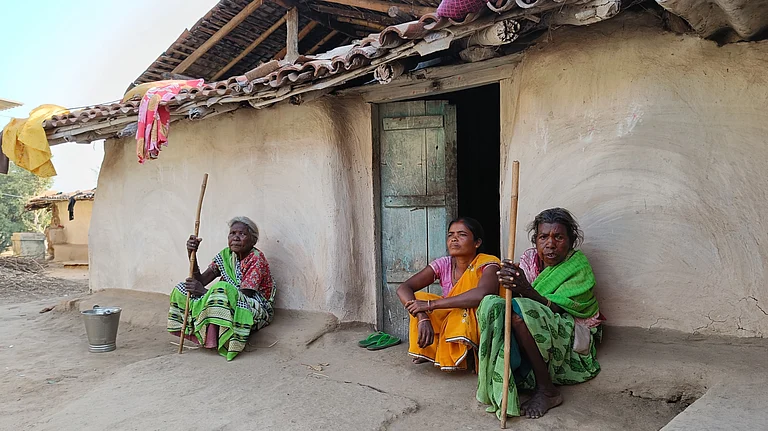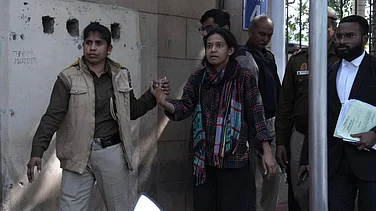She checked her mailbox. There was a large brown envelope from Turtle Island, a small literary magazine from Nordland, Washington, that had published two of her poems. Two red booklets slipped out, with the contributors’ names printed on the cover. There was a note. It spoke of the ten years’ worth of joy in publishing the magazine from tiny Marrowstone Press. Finally, they were wrapping up. It was a good run. Lovely memories, lovely writers, lovely readers, friends. Goodbye. A handwritten note from the two editors.
“We are nominating your poems for the Pushcart Prize this year. Was a delight to have published them. Keep loving the world with your poems. — Linda and Alex.”
She walked up to her studio. Her heart felt heavy.
She began to enjoy her imprisonment. The flash-frozen life suppressed a coil of bitter energy. The delirious beast faltered but raised its scaly head, shot its forked tongue like lightning. It was as if she was cheating the world, sorry and bandaged and dreary and seared by joy inside.
Poems happened. The bleak landscape outside her window, the old-fashioned steam heater in her studio apartment, the oddly high ceilings, the aching confinement. They pushed poetry out, fine and flowing in a creepy way.
Most of the time, her poems came out in small magazines that looked ancient and yellow straight off the press. Once in a while they would appear on the shiny green of travel and gardening glossies.
She stumbled across another video of someone speaking another poem of hers and felt the same shame. They sounded like savage, violent, slippery beasts that had no grace nor care for anyone. How could she speak of such pain? Pain she hadn’t felt herself? What right did she have to dig them out of cold print and fan flames with them?
Her students drifted into her poems. Kendra, a black student in her forties, gave her a handwritten card, inviting her to her graduation ceremony. Megha kept the little card on her bookshelf, at a place where it became the first thing she saw every time she walked into her office.
The note said that Kendra’s twin granddaughters would see her walk with a college degree.
Megha wrote a poem borrowing the voices of the two five-year girls she had not met, singing their delight at their grandmother’s big day.
Our gran’s a little girl/ Our gran, now a big girl.
Our gran, our gran. She longed for husky blues, the old-woman voice of an aging New Orleans crooner, pushing through the wonder of the little girls, proud of their gran, dazed by their pride.
Could a poet speak in tongues? In other people’s tongues? Tongues yet unborn?
The beasts slithered inside her and caused her nausea. Her students babbled. They told her about their lives. They trusted her. They offered themselves. She fed them to the gossip mill of poetry. Their lives came out, skinned and minced, sometimes rhyming, sometimes groping for rhyme.
She violated their privacy. Again, and again. They told her why their parents fought and how they swung between them, wasting away with every swing. They spoke about alcoholism, jealousy, and blooming bell papers in their garden. Sometimes, they sat in her office. She threw them all in the pit of her poetry. They burnt, crinkling, screaming a little, and created the sooty smoke of art.
Sitting in your office, I grow old like your mother
How does someone so young hold us down
Dare to tongue knowledge
So young, so brown, so fucking stupid,
Do you hear, in my voice, a wrinkled wonder?
Tell me if you do, my little girl?
Help me chop the bell peppers for dinner.
Sliver them fine and wet, will you, little girl?
Sometimes she wished she could throw the grad students in the flames. Why wouldn’t she? The bland white grad students who smiled weakly at her as if grinning to some joke in their head. The girl in the computer room who had sharply asked her if she was there to fix the printer. The gnarly professor whose bookshelf she had pushed just a little closer to the window.
She couldn’t. They were wispy creatures, phantoms all. She could only skin and burn those who loved her, who undressed their lives for her. Sometimes they knew the hurt; sometimes they didn’t know they were cut open. But the bruises showed up in her poems.
It was like sleeping with someone and gossiping about the lives they had revealed under the blanket. It was cruel. Her words were cruel. The guilt nudged her. She laughed them away. They nudged her again.
She found sharp pleasure in bringing the poems together in a string. They were like family members who did not like one another very much, sometimes sneering and laughing at each other.
A highly dysfunctional family trying to find its way home.
Excerpted from The Middle Finger by Saikat Majumdar (Rs 599, pp. 240), with permission from Simon & Schuster India
Saikat Majumdar is the author of three previous novels, The Scent of God (2019), The Firebird/Play House (2015/17), and Silverfish (2007), and several works of nonfiction and criticism.






















